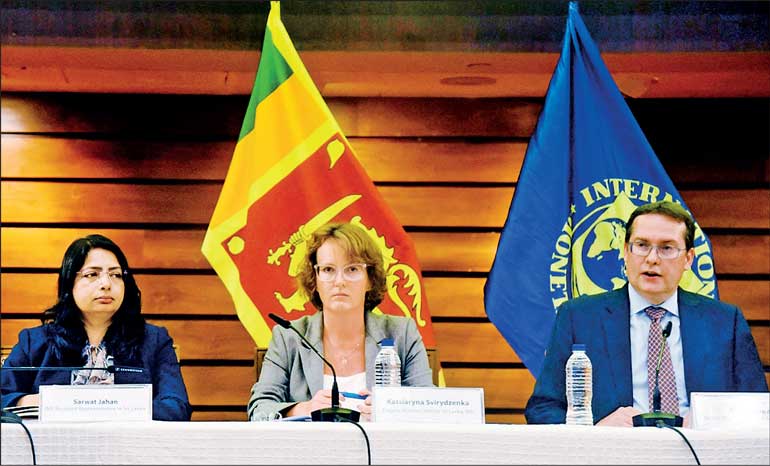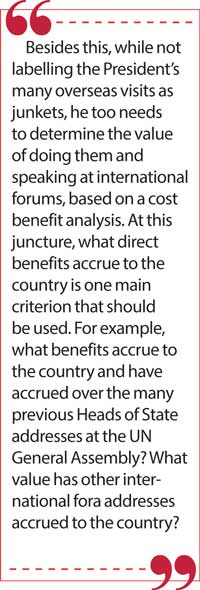Tuesday Feb 17, 2026
Tuesday Feb 17, 2026
Wednesday, 11 October 2023 00:20 - - {{hitsCtrl.values.hits}}

IMF team Senior Mission Chief Peter Breuer (right), Deputy Mission Chief Katsiaryna Svirydzenka (centre) and
IMF Resident representative Sarwath Jahan – AFP
 The international outlook is uncertain again amid financial sector turmoil, high inflation, ongoing effects of Russia’s invasion of Ukraine, and three years of COVID – The IMF
The international outlook is uncertain again amid financial sector turmoil, high inflation, ongoing effects of Russia’s invasion of Ukraine, and three years of COVID – The IMFThe IMF and the World Bank statements highlight the international economic status of the world in the immediate term. Sri Lankans would be ostriches with their heads buried in the sand if they believe that this scenario does not affect them. Based on such a misplaced and misguided view, politicians in Sri Lanka, especially, the Opposition parties continue to pander to this view and promote it, as it is a vote attracting, populist view.
In reality, the following news item in the Daily FT sums up the economic situation in Sri Lanka as observed by the recent IMF delegation who visited the country.
Acknowledges Sri Lanka’s economic progress amid challenges
Says sustaining reform momentum critical to put economy on path towards lasting recovery
Expresses concern over significant disparity between Govt. spending and tax collection
Predicts revenue mobilisation gains will fall short of initial projections by 15% by year end
Govt. is tasked to raise revenue equivalent to 12% of GDP by end-2024
Commends steady progress in implementing structural reforms
Says no fixed timeline for second tranche of $ 2.9 b facility
Notes banks will suffer from restructuring, despite financial stability maintained
Opines people are experiencing consequences of past policies, significant tax cuts in 2019
The IMF staff mission team led by Peter Breuer and Katsiaryna Svirydzenka says:“The objective for the Government in 2024 is to raise revenue, equivalent to 12% of GDP. So there is some way to go to get there. We are looking to the benefits of the tax reforms that were introduced last year to bear full fruit and to be supplemented with appropriate conditionals. In Sri Lanka, there is a big gap between State revenue and expenditure. The expenditures are 19% of GDP and the revenue is 9% of GDP- https://www.ft.lk/top-story/IMF-gives-mixed-scorecard-for-SL/26-753484
 The Titanic obviously cannot sink again. It’s lost at the bottom of the sea. Disturbingly, several reports mentioned here and columnists writing in newspapers have given dire warnings of an impending economic gloom in Sr Lanka and a second sinking of the country. One can only hope these do not come to pass and Sri Lanka will continue to sail in the stormy waters and reach calmer surroundings sooner than later. However, neither the global economic outlook for 2024 nor the economic outlook for Sri Lanka leaves any room for complacency when it comes to chartering a tough economic policy in Sri Lanka. With export markets shrinking, local production showing a decline, the imperative of raising revenue without hurting people who are already hurt looks bleak. If adequate revenue is not generated, the need to curtail expenditure becomes even more crucial. The recent relaxation of imports, including luxury items, does not give the impression that curbing expenditure is a priority when it comes to imports the country can do without, at least till after 2024.The absence of incentives for exporters, as claimed by many exporters, gives the impression that the Government is not focused on promoting exports although the rhetoric is different and loud.
The Titanic obviously cannot sink again. It’s lost at the bottom of the sea. Disturbingly, several reports mentioned here and columnists writing in newspapers have given dire warnings of an impending economic gloom in Sr Lanka and a second sinking of the country. One can only hope these do not come to pass and Sri Lanka will continue to sail in the stormy waters and reach calmer surroundings sooner than later. However, neither the global economic outlook for 2024 nor the economic outlook for Sri Lanka leaves any room for complacency when it comes to chartering a tough economic policy in Sri Lanka. With export markets shrinking, local production showing a decline, the imperative of raising revenue without hurting people who are already hurt looks bleak. If adequate revenue is not generated, the need to curtail expenditure becomes even more crucial. The recent relaxation of imports, including luxury items, does not give the impression that curbing expenditure is a priority when it comes to imports the country can do without, at least till after 2024.The absence of incentives for exporters, as claimed by many exporters, gives the impression that the Government is not focused on promoting exports although the rhetoric is different and loud.
In the backdrop of the IMF assessment, the following statements are worthy of repetition. They question the seriousness of an appreciation of the state of the country’s economy.
Sajith slams govt. over failure to unlock IMF’s second tranche (https://www.adaderana.lk/news.php?nid=93715)
Leader of the Opposition Sajith Premadasa says the Government has failed to fulfil the task they have undertaken in terms of restoring the country’s economic stability. Addressing an event in Akkaraipattu on 28 September, Premadasa emphasised he will ensure an era of economic development under his governance. “Now they are asking why the IMF has delayed in unlocking the second tranche.”“We do not need to respond to that. The IMF itself says the Government has failed to achieve revenue targets.”They took the challenge pretending they are economic experts. It was said that funds will overflow after he [Ranil Wickremesinghe] becomes the President.”Furthermore, Premadasa said the Government has failed to achieve at least the revenue targets. “They are unable to fulfil the job”, he alleged.
Opposition files petition against DDO
https://www.ft.lk/front-page/Opposition-files-petition-against-DDO/44-753491- - 204
Petitioners MPs Ranjith Madduma Bandara and Prof. G.L. Peiris maintain that DDO and tax hikes will have a disproportionately negative effect on the working population
Claims discussions and negotiations conducted by Govt. in relation to DDO were subject to secrecy
Requests SC to declare actions of CBSL and Monetary Board as a violation of fundamental rights
The collapse of the rule of law was also instrumental in the recent economic crisis in the country, Justice Minister Wijeyadasa Rajapakshe said
(https://www.dailymirror.lk/breaking-news/Collapse-of-rule-of-law-instrumental-in-economic-crisis-Wijeyadasa/108-268197
He said this speaking at the inauguration of the National Law Week 2023 at the Supreme Court premises. The Minister said people's awareness of the law is required to achieve the objectives expected by the people from the rule of law in a democratic society.
The economy of Sri Lanka shrank 11.5% year-on-year in the first quarter of 2023, marking a fifth consecutive quarter of contraction, as the country is experiencing its worst financial crisis in decades. (Trading economics (https://tradingeconomics.com/sri-lanka/gdp-growth-annual)
The industrial sector sank 23.4%, with manufacturing falling 14.2%, namely, basic metal and fabricated metal products and machinery and equipment; construction dropped 38.3% and mining and quarrying plunged 45.7%. Also, the services sector went down 5%, mainly dragged down by insurance and financial services. On the other hand, agriculture rose 0.8%, led by rice, fishing, and cereals. The Central Bank sees the economy contracting by 2% this year while the IMF sees it shrinking 3%, before registering a modest growth of 1.5% in 2024. The IMF said in May that Sri Lanka is showing tentative signs of improvement, with inflation moderating, the exchange rate stabilising, and the Central Bank rebuilding reserves buffers -
 Food crisis in Sri Lanka likely to worsen amid poor agricultural production, price spikes and ongoing economic crisis, FAO and WFP warn. (https://www.wfp.org/news/food-crisis-sri-lanka-likely-worsen-amid-poor-agricultural-production-price-spikes-and-ongoing
Food crisis in Sri Lanka likely to worsen amid poor agricultural production, price spikes and ongoing economic crisis, FAO and WFP warn. (https://www.wfp.org/news/food-crisis-sri-lanka-likely-worsen-amid-poor-agricultural-production-price-spikes-and-ongoing
Around 30% of the population are experiencing acute food insecurity and would likely deteriorate further unless urgent assistance is provided. An estimated 6.3 million people in Sri Lanka are facing moderate to severe acute food insecurity and their situation is expected to worsen if adequate life-saving assistance and livelihood support is not provided, the Food and Agriculture Organization of the United Nations (FAO) and the United Nations World Food Programme (WFP) warned in a news report.
Finally, a very “Titanic” columnist item appearing in the Island “Politicos junketing while ordinaries are sinking in COL mire_ Cassandra cry (http://island.lk/politicos- junketing-while-ordinaries-are-sinking-in col-mire/)
These few extracts from among many news items and columnist articles seem to illustrate the strong possibility of a notional second sinking of the Sri Lankan Titanic. Many, if not all Opposition political parties and some within the governing as well, appear to be on the deck of the sinking Titanic, oblivious to the catastrophe about to unfold before their eyes. The string quartet of criticism becomes louder, akin to the band that was playing on the deck while the Titanic was sinking. Offering no specific alternative solutions, the Opposition is drowning in their own criticisms, while leading the public to misery.
The following Daily Mirror editorial “The IMF loan, its fallout and the Opposition’s alternatives (https://www.dailymirror.lk/opinion/The-IMF-loan-its-fallout-and-the-Oppositions-alternatives-EDITORIAL/172-268235), sums up this Titanic destiny very well.
What we need today, are not pompous statements of how badly the masses suffer -it is the masses who are living it, and they know it. We need to know how parties in opposition plan to bring down the cost of living. We need to know if they plan to raise wages without increasing inflation. Workers need a wage where they can afford to provide their children with quality food and education. We want to know how the opposition expects to raise the earnings of the Exchequer so that we do not need to borrow more and more to meet our import bill, without increasing taxes on a long-suffering people. If they have a plan for import substitution, let’s hear it. Our people need to see specific plans, so that they can make an enlightened choice in the event an election is called.
What the country badly needs and would benefit greatly, is an agreement between the Government and the Opposition parties to forge a national multi-party consensus, irrespective of which party is in power, on the following six areas as a minimum, for a period of at least two years:
a. Agreement on the local and foreign debt restructuring program. This is too vital a necessity for the country and its future, for political posturing and points scoring. A country in debt for more than 125% of its GDP and unable to meet its debt repayment obligations is a major problem for the entire country and its current and future generations
b. Agreement on an income tax policy – A fundamental premise should be that high income earners would be taxed more, in percentage terms and real terms, than low-income earners
c. Agreement on an indirect tax policy – While revenue raising is critical and central, the tax on lower income earners should be proportionate to their income
d. Agreement on an expenditure policy – It is unlikely that significant income generating tax reforms could be introduced for lower income earners considering that the tax burden is already very high on them. Government expenditure on some goods and services have to be curtailed for a period of two years. All subsidies would have to be considered under this agreement and a determination made on a temporary pause on some of them for a period of two years
d. Agreement on a food security policy – Some determinants such as the weather obviously are beyond the control of any political party in the short term. It would be ideal and truly patriotic if all political parties could agree on a broad climate change and environment protection policy. However, food security in the short term should include a policy setting out how security could be assured in the event that local production of basic food items, as predicted by the WFP and the FAO comes to pass.
Finally, on the subject of junkets, the Government has to put a stop to them. Besides this, while not labelling the President’s many overseas visits as junkets, he too needs to determine the value of doing them and speaking at international forums, based on a cost benefit analysis. At this juncture, what direct benefits accrue to the country is one main criterion that should be used. For example, what benefits accrue to the country and have accrued over the many previous Heads of State addresses at the UN General Assembly? What value has other international fora addresses accrued to the country? There has to be a direct benefit such as, signing trade agreements, opening export markets, increase in foreign investments in Sri Lanka, supporting climate change initiatives, educational, research and job opportunities for Sri Lankans in countries visited by the Head of State, that determine the worth of such visits.
In the context of advancing foreign investments, expanding export markets via investments in Sri Lanka, what matters at the end of the day is the question of confidence that such would be investors have and would have with governance in Sri Lanka. A bankrupt country, with a collection of unruly, unprincipled and unethical politicians, a similar group of civic society and religious leaders who influence politicians and the political process, corruption rampant at all levels of the society, a lop-sided law and order enforcement that reinforces the adage that “some are more equal than others”, does not and will not provide the confidence that would be investors need.
The statement by the Justice Minister Wijeyadasa Rajapakshe aptly describes the situation in the country “the collapse of the rule of law was also instrumental in the recent economic crisis in the country”. One correction that needs to be made to this statement is that the rule of law has always favoured some over others and it is one key area that has dissuaded long term investments being made in the country and given rise to imperfect, unequal playing fields for local investors as well.
 The question that should be uppermost in the minds of all Sri Lankans is whether the Opposition political party leaders would meet the President and Government leaders to discuss the above mentioned six imperatives and agree on them for the proposed two year period. A high-level multi-party monitoring committee could be formed thereafter to make sure all signatories to the agreement abide by it for the duration of the two years. If this happens, international lending agencies such as the IMF, the World Bank, Asian Development Bank, and many friendly countries, as well as potential investors would be more encouraged than now to prevent the Sri Lankan Titanic from sinking again.
The question that should be uppermost in the minds of all Sri Lankans is whether the Opposition political party leaders would meet the President and Government leaders to discuss the above mentioned six imperatives and agree on them for the proposed two year period. A high-level multi-party monitoring committee could be formed thereafter to make sure all signatories to the agreement abide by it for the duration of the two years. If this happens, international lending agencies such as the IMF, the World Bank, Asian Development Bank, and many friendly countries, as well as potential investors would be more encouraged than now to prevent the Sri Lankan Titanic from sinking again.